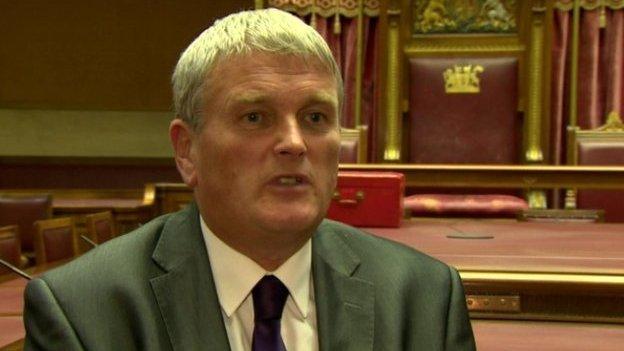What's in new DUP ministers' in-trays?
- Published
Northern Ireland's new executive ministers, announced in a DUP reshuffle, face a number of pressing issues in their new jobs.
Finance Minister Arlene Foster
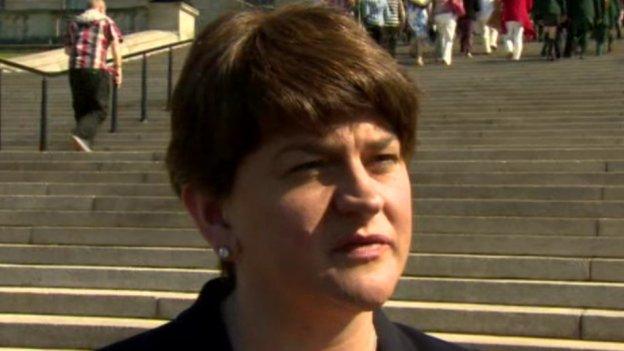
Finding a solution to the welfare reform impasse will be a key challenge for Arlene Foster
Implementing the Stormont House Agreement
The agreement involves a series of interlocking commitments on welfare reform, a balanced budget and public sector redundancies - the Department of Finance is at the centre of that.
The welfare element of the agreement collapsed just before the election. Sinn Féin said the plans for implementing the deal did not provide the levels of protection for claimants that they wanted; the DUP said Sinn Féin's demands were not part of the deal and were unaffordable.
The longer that impasse continues, the more pressure is placed on the executive's budget, because the equivalent of about £2m a week is being reallocated from departmental spending to welfare.
So as well as trying to reach a deal with Sinn Féin, Mrs Foster also has to manage a tight budget.
A regular budget reallocation is due next month - what's known as the June monitoring round - but it could be pushed back if there is no welfare deal.
Voluntary exit scheme
More than 7,000 civil servants have expressed an interest in the voluntary redundancy scheme.
The aim of the scheme is to lose the equivalent of 2,400 full-time posts saving £90m from the annual civil service pay bill.
It is to be paid for out of additional borrowing powers agreed as part of the Stormont House Agreement.
However, if there is no welfare deal the minister may have to go back to the Treasury to see if the borrowing for the scheme can still proceed.
Public sector reform
The previous finance minister, Simon Hamilton, began work aimed at reforming the public sector.
He has asked the OECD, the Paris-based think-tank, to look at the strategic direction and operation delivery of the entire public sector.
It was very much his big idea - the new minister will now have to take this work forward.
Health Minister Simon Hamilton
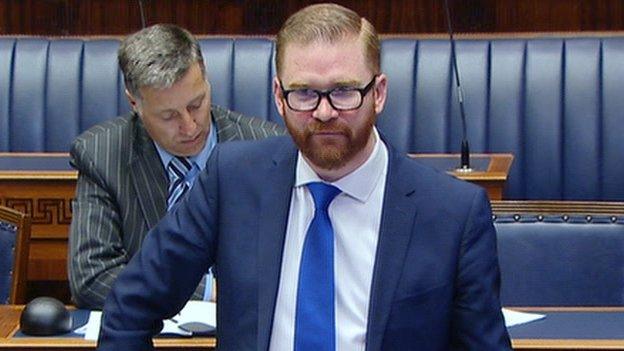
Simon Hamilton will have a number of contentious decisions to make
Abortion legislation
Among the highly contentious and emotive issues Mr Hamilton will have to deal with is abortion legislation and whether it will be amended to include cases of fatal foetal abnormality.
At the start of the month, First Minister Peter Robinson said Justice Minister David Ford's recommendation to change the abortion law was doomed.
Mr Robinson said proposed draft guidelines offered a better way forward than legislation.
Blood ban
Mr Hamilton will also have to consider gay equality rights and whether the blood ban from men who have sex with men will continue in Northern Ireland.
Earlier this year, a judge ruled the then health minister Edwin Poots did not have the power to keep the ban.
However, Mr Poots' successor, Jim Wells, appealed the judgment.
Hospital closures
Another controversial issue will be the closure of hospitals.
In January, a review into Northern Ireland's health service said there were too many hospitals for the 1.8m population.
The review was led by the former chief medical officer of England, Sir Liam Donaldson.
Enterprise Minister Jonathan Bell

Jonathan Bell will have to reassure potential investors that reduced corporation tax is coming
Corporation Tax
The legislation which allows corporation tax to be devolved to Stormont has been passed at Westminster.
But with the DUP and Sinn Féin still deadlocked on welfare reform they have yet to agree 'a rate and a date' - the rate at which they'll set the devolved tax and the date from which it will apply.
Mr Bell will have to reassure potential investors that reduced corporation tax is coming and they should continue planning for it.
Energy
Major changes are coming to the renewable energy industry in Northern Ireland, driven by changes to the UK-wide subsidy system.
Renewable energy projects which in the past were guaranteed a grant will now have to take part in UK-wide competition for subsidy payments.
Mr Bell will have to decide if the executive's target of having 40% of electricity generation from renewables by 2020 will have to be abandoned as a consequence.
Exports
Northern Ireland has struggled to grow its exporting base - some of that is down to external factors such as the Eurozone crisis.
However, very few companies in Northern Ireland are exporters and that needs to change if the economy is to grow.
The NI Chamber of Commerce has told MLAs that the executive's plan for exports is "fragmented" and that more needs to be done to recognise that every business looking to export has different requirement.
Tourism
Mr Bell will be keen to build on some steady improvement in Northern Ireland tourism.
There are some weak spots to be tackled, including the struggle to attract visitors from the Republic of Ireland.
One fundamental issue to be addressed is opening up new air routes, particularly to places like Germany and Scandinavia.
An air routes development fund is under consideration for introduction next year.
- Published11 May 2015
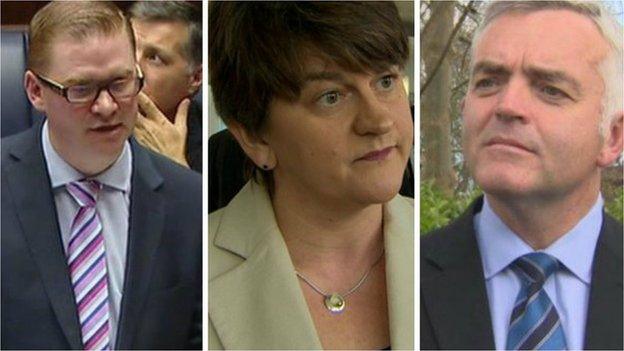
- Published27 April 2015
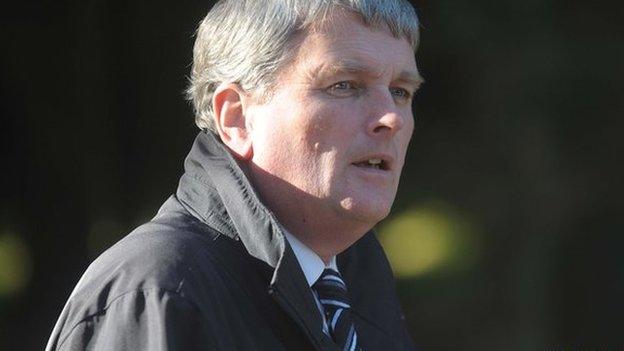
- Published27 April 2015
